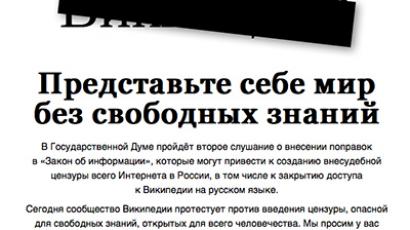Russian Duma adopts 'web blacklist' bill despite SOPA-style censorship outcry
Russia's lower house of parliament has passed the bill in its third and final reading, despite criticism of censorship from the country's most popular websites.
The original proposal, which has been under review in the Duma since last week, implied that only “harmful information” would be censored.However, that phrase was amended on Tuesday night, and the list of reasons for which the government will be allowed to shut down a site is now strictly defined.The list includes web pages which advocate suicide, substance abuse, excessively risky behavior, and child pornography.But critics believe the blacklist of not-for-children sites will restrict internet freedom. The proposal aims to introduce a non-governmental internet watchdog, which would monitor the web for potentially harmful content and request hosting companies to restrict access to those pages. If hosting companies refuse, the page would then become blacklisted.
Top Russian websites have joined Wikipedia in the fight against a bill which would restrict access to online information. Yandex, Vkontakte, and LiveJournal have spoken out against the draft law, which they claim will pave the way for internet censorship in Russia.Search engine Yandex responded to the bill by crossing out the word “everything” out of its logo which usually reads “You can find everything.”The company also provided a link to a statement which warned the legislation may stifle free speech, and questioned the bill’s “rash” adoption.“We think it’s necessary to maintain the balance of public interests and also consider technological characteristics of the internet, that’s why a review of the draft law must be postponed, with the legislation openly discussed,” said Yandex’s chief editor, Elena Kolmanovskaya, in the statement.The move comes a day after online encyclopedia Wikipedia declared a 24 hour blackout against the bill. Visitors to the Russian Wikipedia site were unable to access it on July 10. Those who tried saw a black censorship banner over the word Wikipedia, which read, “Imagine a world without free knowledge.” A statement on the Wikipedia homepage read, “Lobbyists and activists supporting the amendments claim they are only aimed against content like child pornography and ‘similar things’, but strict adherence to the wording of the bill proposed for consideration will result in the creation in Russia of a system similar to the ‘Great Firewall of China’.”In January this year, English-language Wikipedia and other internet giants participated in a blackout, in order to protest SOPA and PIPA bills in the U.S. Congress and Senate. Critics claimed they would empower the government beyond reason, and would damage the internet as a result. Both bills have since been put on hold.














